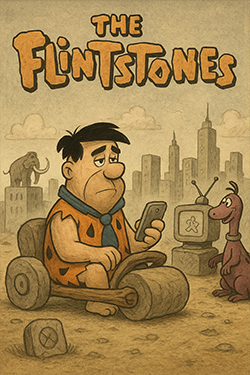
The Flintstones: A Primitive Reflection on Modern Life
The Flintstones, a show where the wheel has been invented, but the existential crisis has yet to be fully realized. Set in the idyllic prehistoric town of Bedrock, this animated series asks the fundamental question: if the dawn of civilization is already absurd, what does that mean for us? The titular characters, Fred and Wilma, the eternal couple in a world of stone, absurdity, and dino-powered appliances, embody the human condition in all its paradoxical glory.
At its core, The Flintstones explores the struggle of the modern human, trapped between progress and the immutable limits of existence. Fred, with his absurdly laborious job at the quarry, serves as the quintessential symbol of the existentialist hero: doomed to repeat his monotonous daily rituals, his dreams of success are mere illusions. His futile pursuit of happiness through a giant foot-powered car is a perfect metaphor for the Sisyphean nature of modern life. Wilma, forever constrained by her role as the “stay-at-home” wife in a society stuck in the Stone Age, represents the tragic absurdity of societal expectations.
Yet, beneath its prehistoric veneer, The Flintstones offers profound insight into the nature of our civilization. The show’s bizarre juxtaposition of stone tools with modern conveniences speaks to the dissonance between our technological achievements and our inability to find true meaning in life. In a world where dinosaurs power vacuum cleaners, we are forced to confront the absurdity of our own existential struggles. If The Flintstones proves anything, it’s that, no matter the age, the quest for meaning is always just a stone’s throw away.
